The Black Sea Is Becoming Ground Zero in the Ukraine War
Kyiv’s counteroffensive efforts have focused on cutting Russia off from Crimea, while the grain export deal continues to falter.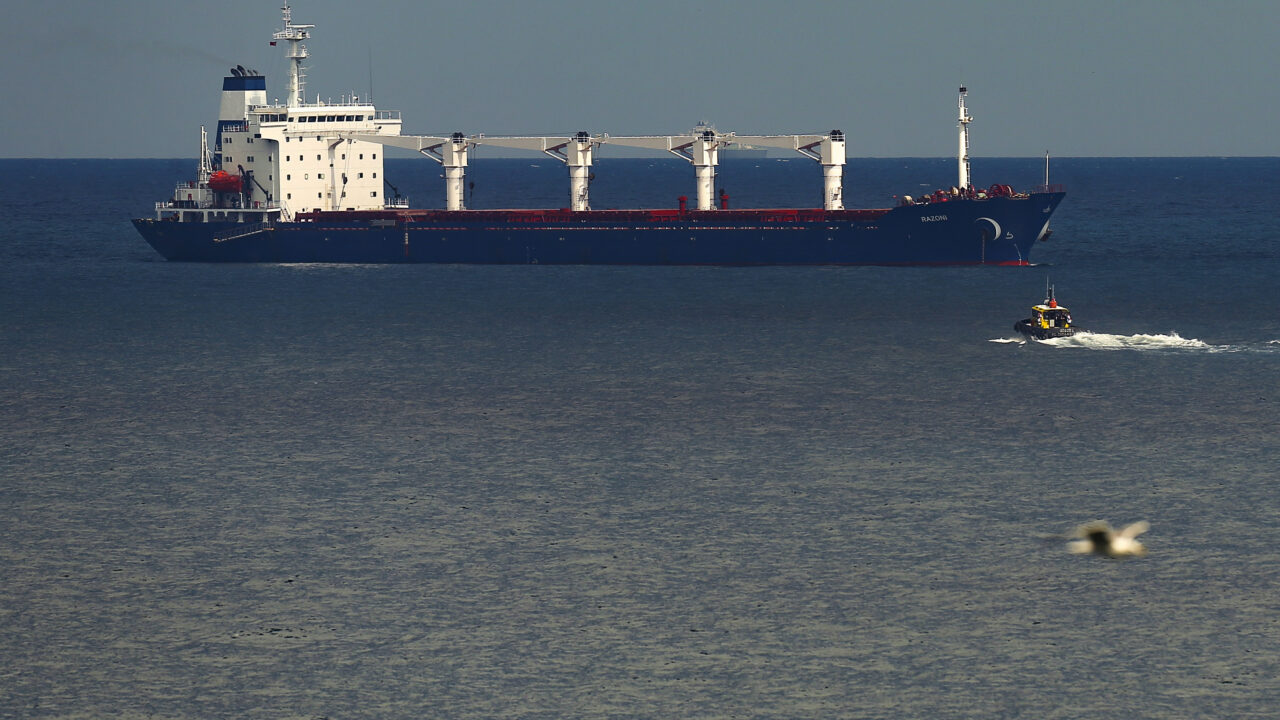 FILE - A boat with Russian, Ukrainian, Turkish and U.N. officials heads to the Sierra Leone-flagged cargo ship Razoni at an inspection area in the Black Sea off the coast of Istanbul, Turkey, on Aug. 3, 2022. In July 2023 Moscow withdrew from the grain deal and has since declared large swaths of the Black Sea dangerous for shipping. (AP Photo/Emrah Gurel, File)
FILE - A boat with Russian, Ukrainian, Turkish and U.N. officials heads to the Sierra Leone-flagged cargo ship Razoni at an inspection area in the Black Sea off the coast of Istanbul, Turkey, on Aug. 3, 2022. In July 2023 Moscow withdrew from the grain deal and has since declared large swaths of the Black Sea dangerous for shipping. (AP Photo/Emrah Gurel, File)
Typically the Ukraine war is framed as a conflict between East and West, between Russia and Europe. But the conflict also runs along the North/South axis.
Historically, Russia conquered Ukraine from the north, and tried to extend its empire south through the Caucasus and around the Black Sea. Crimea’s naval facilities are a key strategic asset for Russia, and Crimea itself is both an iconic and practical cornerstone of Russia’s imperial identity.
Thus it should be no surprise that this summer has seen an escalation of military action in and around the Black Sea.
A primary goal of the Ukrainian summer offensive is to sever the land bridge along the northern shore of the Sea of Azov that connects Russia to the occupied peninsula of Crimea. Ukraine has launched strikes that hit ammunition bases and fuel dumps in Crimea and Russia itself. On August 4, a Ukrainian sea drone struck the Russian landing ship Olenegorsky Gornyak in Novocherkassk, Russia’s main Black Sea port for the export of oil. The next day another drone damaged a Russian tanker in the Kerch Strait. Now, Russia is planning to install booms and nets to protect its ports and the Kerch Strait bridge from future sea drone attacks.
A primary goal of the Ukrainian summer offensive is to sever the land bridge along the northern shore of the Sea of Azov that connects Russia to the occupied peninsula of Crimea.
Let’s rewind a bit. In July 2022 Russia agreed to a deal brokered by the UN and Turkey President Recep Tayip Erdoğan which allowed Russian and Ukrainian ships to export grain through the Black Sea. This provided over $1 billion revenue to Ukraine and eased the price surge on the global grain market.
However, in July 2023 Russia announced it was withdrawing from the deal — and followed this with reinforcing its blockade and a wave of missile strikes on Ukrainian grain export facilities. Russia had long expressed its unhappiness with the deal, asking for concessions such as access for Russian traders to Western insurance and the reopening of an export pipeline to Odessa for Russian ammonia (a key fertilizer ingredient).
But the immediate cause of its revocation of the deal was probably the fact that Ukraine struck the Kerch Strait bridge connecting Russia to Crimea on July 17. (Ukraine had previously hit the Kerch bridge in October 2022.)
Ukraine is asking Turkey, Romania or Bulgaria to provide escort vessels to enable grain exports to resume, but this is unlikely given the risk of military action by Russia. On Friday. Kyiv has also announced a plan for a “humanitarian corridor” to get vessels trapped by Russia since February 2022 out of its Black Sea ports.
Russia’s horizontal escalation of the war by attacking Ukraine’s grain exports reflects Moscow’s increasing desperation given the lack of a path to total victory, or an exit strategy absent total victory.
With Russia shut out of Europe, the southern dimension becomes increasingly important — economically, politically and militarily. The eastern flank of the Black Sea has become an important economic conduit for Russia. Turkey, Georgia and Armenia are transit countries for Russian importers seeking to evade Western sanctions. There are direct flights between Russia and Turkey, Georgia and Armenia — while in Europe Serbia is the only country with flights to Moscow.
In May 2023 Putin canceled the visa regime for Georgians and lifted the ban on flights to the country. There are an estimated 100,000 Russians in Georgia. They include people evading political repression or the draft, but many are IT professionals who find it easier to live and work outside Russia. They have provided a boost to Georgia’s economy. Georgian exports to Russia were up 75 percent in the first half of 2023, at $1.3 billion, and the country earned $4.37 billion in remittances from Georgians working in Russia in 2022.
There is a brisk trade in sanctioned goods across the border between Georgia and the secessionist province of Abkhazia, from where they are driven into Russia. In the first quarter of 2023, German exports to Georgia rose 48 percent, to Armenia 132 percent and Kyrgyzstan 770 percent. There is some opposition to the influx of Russians amongst the Georgians since they have driven up housing costs. There is still resentment of Russia in Georgia because of the 2008 war, though economic self-interest seems to be outweighing historic grievances.
Armenia saw 13 percent GDP growth in 2022 thanks to the influx of Russians. They do a brisk business buying used cars from Europe and exporting them to Russia, to the tune of $180 million a month. (There is also re-export of used cars to Russia via Dubai.)
Russia’s horizontal escalation of the war by attacking Ukraine’s grain exports reflects Moscow’s increasing desperation given the lack of a path to total victory, or an exit strategy absent total victory.
Armenia has a closer political relationship with Russia than Georgia, and hosts several Russian military bases. But there is anger that Russia did not do more to help Armenia protect Karabakh, which was overrun by Azerbaijani forces in the 2020 war. Karabakh is now subject to an Azerbaijani blockade despite the presence of Russian peacekeepers ostensibly there to protect its remaining Armenian population.
Iran is an increasingly important partner for Russia, working together to prop up the Assad regime in Syria. Iran has supplied drones to attack Ukrainian cities, and helps repair some of Russia’s sanctioned Western aircraft. Iran recently became the ninth member of the Shanghai Cooperation Organization, through which Russia and China coordinate their policies in Central Asia.
Turkey is the most important regional player, one of the few countries to enjoy a degree of trust in both Kyiv and Moscow. After 2014, Turkey blocked proposals from Romania to step up NATO’s presence in the Black Sea. On February 27, 2022 Turkey invoked the 1936 Montreux Convention and barred any warships from entering the Black Sea.
After the February 2022 invasion, NATO deployed a ‘tailored Forward Presence” in the form of two multinational brigades in Bulgaria and Romania. Erdoğan eventually buckled to Western pressure and withdrew his objections to Sweden and Finland joining NATO.
The grain deal was President Erdoğan’s most important achievement, but he faces an uphill struggle in persuading Russia to return to the negotiating table. Russia relies on Turkey as a trade partner, so Moscow cannot afford to alienate Erdoğan. Hopefully, political pressure from the global South, concerned by spiraling grain costs, will convince Russia to revive the grain deal.
Meanwhile, Russia will continue with its efforts to build a north-south trade network through the Caucasus and Iran, making the Black Sea a critical node in its war on Ukraine today.
Your support is crucial…With an uncertain future and a new administration casting doubt on press freedoms, the danger is clear: The truth is at risk.
Now is the time to give. Your tax-deductible support allows us to dig deeper, delivering fearless investigative reporting and analysis that exposes what’s really happening — without compromise.
Stand with our courageous journalists. Donate today to protect a free press, uphold democracy and unearth untold stories.

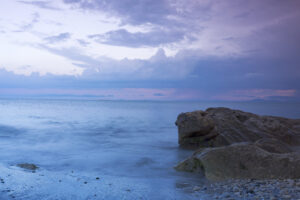
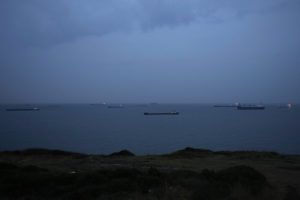

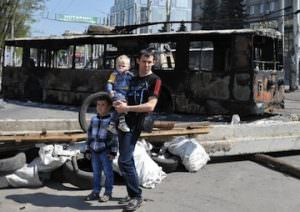
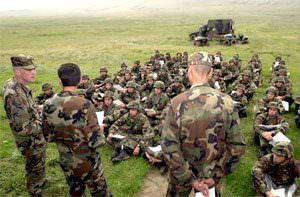


You need to be a supporter to comment.
There are currently no responses to this article.
Be the first to respond.